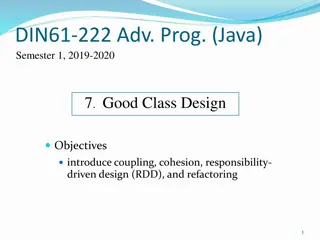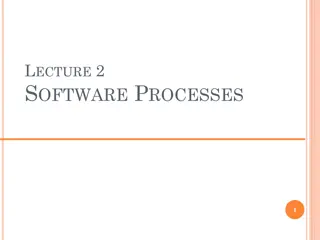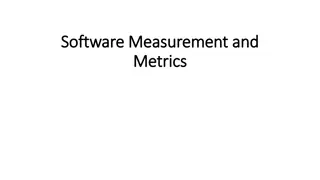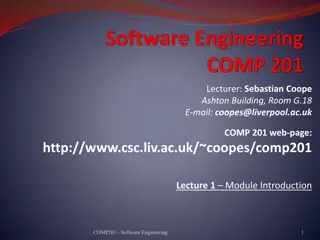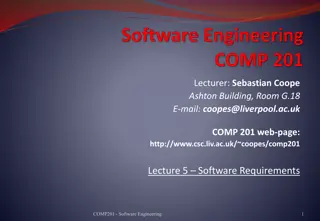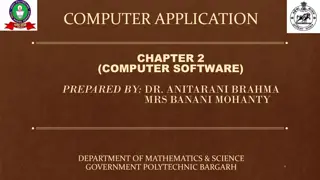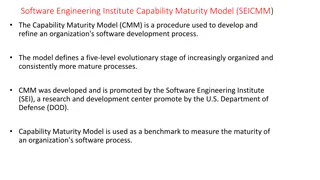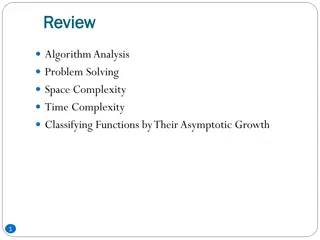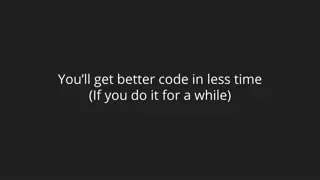Refactoring Methods for Composing Code in Software Construction
Explore the key concepts of refactoring methods for composing code in software development. Learn about techniques such as Extract Method and how they can improve code readability, maintainability, and reusability. Understand the process of creating well-named methods and optimizing code structure for better software evolution.
Download Presentation

Please find below an Image/Link to download the presentation.
The content on the website is provided AS IS for your information and personal use only. It may not be sold, licensed, or shared on other websites without obtaining consent from the author. Download presentation by click this link. If you encounter any issues during the download, it is possible that the publisher has removed the file from their server.
E N D
Presentation Transcript
Software Construction and Evolution - CSSE 375 Composing Methods Shawn & Steve Ch 6 in Fowler Q1
Composing Methods What they do! How quickly understood? Refactoring deals a lot with composing methods to properly package code Refactor methods that are too long or do too much Extract Method Inline Method Inline Temp Replace Temp with Query Introduce Explaining Variables Split Temporary Variable Remove Assignments to Parameters Replace Method with Method Object Substitute Algorithm Q2 Read about these on your own! 2
Extract Method Situation: You have a code fragment that can be grouped together Method is too long Needs Clarity comments to reflect purpose Undue redundancy Solution: Turn fragment into a method whose name explains the purpose of the method Shorter well-named methods Can be used by other methods Higher-level methods read more like a series of comments 3
Exact Method: Simple Example void printOwing() { printBanner(); Clue bird landing //print details System.out.println("name: " + _name); System.out.println("amount: " + amount); } 4
Extract Method: Simple Example void printOwing() { printBanner(); printDetails(amount); } void printDetails (double amount) { System.out.println ("name: " + _name); System.out.println ("amount " + amount); } 5
Mechanics Create a new method and name it after what it does it s intention Copy extracted code from source into target Scan extracted method for references to any variables that are local to the source method Local variables /parameters to the target method Check for temporary variables used within extracted code If present, declare them in the target method as temporary variables Q3 6
Mechanics (continued) Check for local-scope variables modified by extracted code 1 modified variable: treat extracted code as query and assign result to variable concerned More than 1 variable: can t extract method From extracted code, pass local-scope variables into target as parameters Replace extracted code in source method with a call to target method Q3 Compile and test 7
More Detailed Example void printOwing() { Enumeration e = _orders.elements(); double outstanding = 0.0; Problem 1 // print banner System.out.println ("**************************"); System.out.println ("***** Customer Owes ******"); System.out.println ("**************************"); Problem 2 // calculate outstanding while (e.hasMoreElements()) { Order each = (Order) e.nextElement(); outstanding += each.getAmount(); } //print details System.out.println ("name:" + _name); System.out.println ("amount" + outstanding); Problem 3 } 8
More Detailed Example Extract 2 Methods Extract 2 void printDetails (double outstanding) { System.out.println ("name: " + _name); System.out.println ("amount " + outstanding); } void printBanner() { // print banner System.out.println ("**************************"); System.out.println ("***** Customer Owes ******"); System.out.println ("**************************"); } Extract 3 9
More Detailed Example Extract Orders void printOwing() { double outstanding = getOutstanding(); printBanner(); PrintDetails(outstanding); } double getOutstanding() { Enumeration e = _orders.elements(); double outstanding = 0.0; while (e.hasMoreElements()) { Order each = (Order) e.nextElement(); outstanding += each.getAmount(); } return outstanding; } void printDetails (double outstanding) { } void printBanner() { } Extract 1 10
More Detailed Example Extracted Methods void printOwing() { double outstanding = getOutstanding(); printBanner(); PrintDetails(outstanding); } double getOutstanding() { Enumeration e = _orders.elements(); double outstanding = 0.0; while (e.hasMoreElements()) { Order each = (Order) e.nextElement(); outstanding += each.getAmount();} return outstanding; } void printDetails (double outstanding) { System.out.println ("name: " + _name); System.out.println ("amount " + outstanding); } void printBanner() { System.out.println ("**************************"); System.out.println ("***** Customer Owes ******"); System.out.println ("**************************"); } Extract 1 Extract 2 Extract 3 Q4 11
Exercise Reassign a Local Variable void printOwing() { double outstanding = getOutstanding(); printBanner(); PrintDetails(outstanding); } double getOutstanding() { Enumeration e = _orders.elements(); double outstanding = 0.0; while (e.hasMoreElements()) { Order each = (Order) e.nextElement(); outstanding += each.getAmount(); } return outstanding; } void printDetails (double outstanding) { System.out.println ("name: " + _name); System.out.println ("amount " + outstanding); } void printBanner() { System.out.println ("**************************"); System.out.println ("***** Customer Owes ******"); System.out.println ("**************************"); } Q5-1 12
Example: Reassigning a Local Variable Outstanding used in both places We need to return it from the extracted method Outstanding is initialized only to an obvious initial value Can initialize it only within the extracted method If something more involved happens to the variable, we have to pass in the previous value as a parameter 13
Exercise Reassigned a Local Variables void printOwing(double previousAmount) { double outstanding = previousAmount; printBanner(); double outstanding = getOutstanding(); PrintDetails(outstanding); } double getOutstanding(double initialValue) { Enumeration e = _orders.elements(); double result = initialValue; while (e.hasMoreElements()) { Order each = (Order) e.nextElement(); result += each.getAmount(); } return result; } void printDetails (double outstanding) { System.out.println ("name: " + _name); System.out.println ("amount " + outstanding); } void printBanner() { System.out.println ("**************************"); System.out.println ("***** Customer Owes ******"); System.out.println ("**************************"); } How would you clarify this version? Q5-2 14
Inline Method Situation: A method s body is as clear as its name why have the method? Use short methods Needless Indirection Solution: Put the method s body into the the body of its callers and remove the method Int getRating() { return (moreThanFiveLateDeliveries()) ? 2 :1; } boolean moreThanFiveLateDeliveries() return _numberOfLateDeliveries > 5; } Int getRating() { return (_numberOfLateDeliveries > 5) ? 2 :1; } Q6 15
Inline Temp Situation: Temp assigned to once with a simple expression, and temp getting in the way of other refactorings? Solution: Replace all references to the temp with the expression. double basePrice = anOrder.basePrice(); return (basePrice > 100); return (anOrder.basePrice() > 100); 16
Replace Temp with Query Situation: Using a temporary variable to hold the result of an expression unnecessarily Solution: Extract the expression into a method. Replace all references to the temp with the expression. double basePrice = _quantity * _itemPrice; if (basePrice > 1000) return basePrice * 0.95; else return basePrice * 0.98; if (basePrice() > 1000) return basePrice() * 0.95; else return basePrice() * 0.98; ... double basePrice() { return _quantity * _itemPrice; } Q7 17 17
Whats Fowlers thing about Temps? Everyone defining a Temp to be something will use a different name. So, Temps complicate your ability to understand new code. Like, How do you order a milkshake in other places? Thickshake Frappe Malt Leche malteada 18
Introduce Explaining Variable Situation: You have a complicated expression. Solution: Put result of the expression, or parts of the expression, in a temporary variable with a name that explains the purpose. if ( (platform.toUpperCase().indexOf("MAC") > -1) && (browser.toUpperCase().indexOf("IE") > -1) && wasInitialized() && resize > 0 ) { // do something } final boolean isMacOs = platform.toUpperCase().indexOf("MAC") > -1; final boolean isIEBrowser = browser.toUpperCase().indexOf("IE") > -1; final boolean wasResized = resize > 0; if (isMacOs && isIEBrowser && wasInitialized() && wasResized) { // do something } 19
Split Temporary Variables Situation: Have a temporary variable assigned to more than once Exception: a loop nor collecting temporary variable Solution: Make a separate temporary variable for each assignment double temp = 2 * (_height + _width); System.out.println (temp); temp = _height * _width; System.out.println (temp); final double perimeter = 2 * (_height + _width); System.out.println (perimeter); final double area = _height * _width; System.out.println (area); Q8 20
Remove Assignments to Parameters Situation: The code assigns to a parameter. Solution: Use a temporary variable instead. int discount (int inputVal, int quantity, int yearToDate) { if (inputVal > 50) inputVal -= 2; int discount (int inputVal, int quantity, int yearToDate) { int result = inputVal; if (inputVal > 50) result -= 2; 21
A more detailed example refactor? From your swap homework: private void setTitleMonth(int n, int year) { switch (n) { case (1): this.monthTitle.setText("January " + year); this.monthName = "January " + year; break; case (2): this.monthTitle.setText("February " + year); this.monthName = "February " + year; break; case (3): this.monthTitle.setText("March " + year); this.monthName = "March " + year; break; case (4): this.monthTitle.setText("April " + year); this.monthName = "April " + year; break; case (5): 22
Review - Bad Smells in Code Duplicated Code Long Method Large Class Long Parameter List Divergent Change Shotgun Surgery Feature Envy Data Clumps Primitive Obsession Switch Statements Lazy Class We addressed some of these with the refactorings today! More to come Parallel Inheritance Hierarchies Speculative Generality Temporary Field Message Chains Middle Man Inappropriate Intimacy Incomplete Library Class Data Class Refused Bequest Alternative Classes w/ varied interfaces Comments 23



